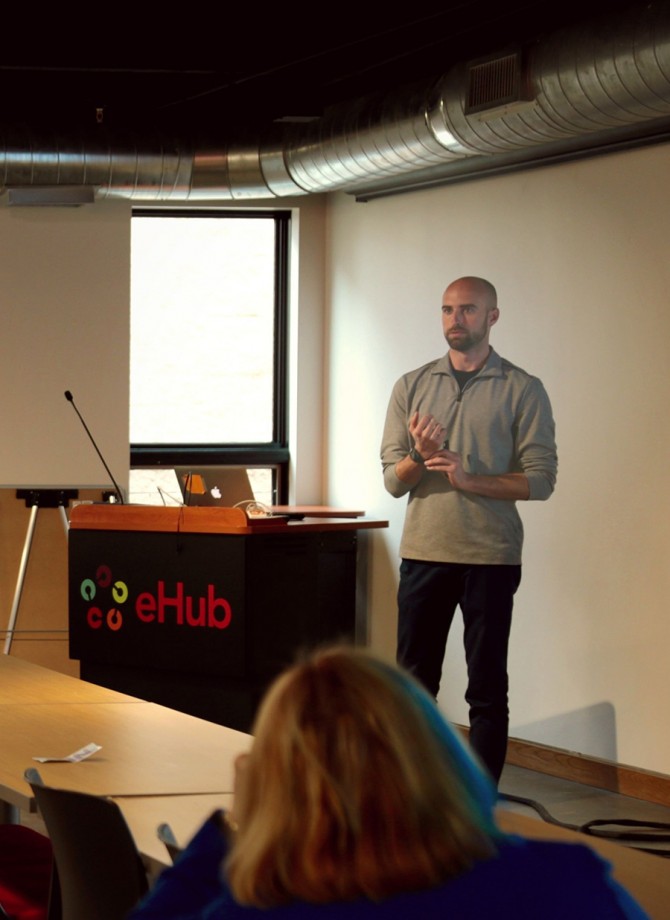Biotech startups face ‘cold, hard truth’ in I-Corps program
By Noah Schumer
After two weeks of intense workshops, mentoring from seasoned entrepreneurs and 30-plus interviews with prospective customers, biotech startups in Cornell’s I-Corps Short Course presented what they learned.
Each startup had several questions to answer: Do people need their invention? Did their technology solve a real-world problem? Should they continue pursuing their startup? They all had to decide whether they had identified a valid product market fit for their invention and whether it was time to continue growing the business.
Cornell hosted a biotechnology-focused National Science Foundation (NSF) I-Corps Short Course April 13 for startup founders and researchers with ideas for products and services. Throughout the NSF-funded program, startup teams are taught how to practice customer discovery and learn from potential customers about the market fit for their inventions.
At the end of the program, entrepreneurs revisit their initial hypotheses, construct a new value proposition and revise their business plans.
“It’s been an excellent experience,” said Dr. Wilfrido Mojica, a program participant and professor at the University at Buffalo’s Jacobs School of Medicine and Biomedical Sciences. “It allows you to do exactly what you’re supposed to do, which is validate, refute or pivot. It saves you money because you can vet your idea, which is the intention, and from the interviews, you see the market.”
Six teams participated in the program under the guidance of the course instructors: Michael Riedlinger, director of the Rochester BioVenture Center and the technology commercialization manager for High Tech Rochester; and Ken Rother, an entrepreneur-in-residence at Rev: Ithaca Startup Works, managing director of eLab and a visiting lecturer at the Samuel Curtis Johnson Graduate School of Management.
Several times during the event, Rother stressed a key learning concept of I-Corps: Entrepreneurs need to understand the problems potential customers face, then design solutions to those problems. It is much less effective to present the features of the product and leave it up to the customer to think of how it could benefit them.
“At this phase, it’s important to go out, talk to customers and understand the problems they’re facing before entering with your solution,” said Teddy Brinkofski ’18, who was referred to the I-Corps program through the McGovern Family Center for Venture Development in the Life Sciences. “For that reason, the I-Corps Short Course has been very useful. Focusing on the problem has changed how I’m moving forward with my business concept. It’s made me more prepared to go out into the market.”
“As a scientist, I tend to gravitate towards the technical aspects of the company and I’m a little bit shy about going out and interviewing customers,” added Jonathan Alden, Ph.D. ’15. “Getting ideas about interview techniques and doing the interviews has been really helpful.”
The concluding workshop for all I-Corps short courses is a highly participatory day where each team presents what they learned to their peers and instructors. Group discussions often break out during the presentations and peer teams share tips and advice with one another.
“One of the great things about the format of I-Corps is that everyone is engaged, thinking and commenting,” said Riedlinger. “Everybody benefits from that.”
While Mojica acknowledged it was nerve-wracking to get direct feedback on his idea, he said the experience would serve him well as he moves forward as an entrepreneur.
“That’s what you need, it’s the hard-cold truth,” he said. “My problem is distilling the information into clearer language. That’s what I need and that’s what I’ve gotten, so it’s perfect.”
Noah Schumer ’19 is a writer for the Center for Regional Economic Advancement.
Media Contact
Get Cornell news delivered right to your inbox.
Subscribe

